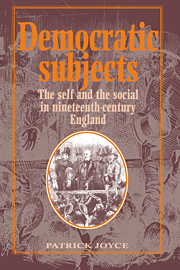Book contents
- Frontmatter
- Contents
- List of plates
- Acknowledgements
- Introduction
- Part One The sorrows of Edwin Waugh: a study in ‘working-class’ identity
- Part Two John Bright and the English people: a study in ‘middle-class’ identity
- Part Three Democratic romances: narrative as collective identity in nineteenth-century England
- 12 Narrative and history
- 13 The romance of improvement
- 14 The aesthetic framing of the social
- 15 The constitution as an English Eden
- 16 The story of the cruel Turk
- 17 Some democratic leading men, or Mr Gladstone's dream
- Appendices
- Index
15 - The constitution as an English Eden
Published online by Cambridge University Press: 10 December 2009
- Frontmatter
- Contents
- List of plates
- Acknowledgements
- Introduction
- Part One The sorrows of Edwin Waugh: a study in ‘working-class’ identity
- Part Two John Bright and the English people: a study in ‘middle-class’ identity
- Part Three Democratic romances: narrative as collective identity in nineteenth-century England
- 12 Narrative and history
- 13 The romance of improvement
- 14 The aesthetic framing of the social
- 15 The constitution as an English Eden
- 16 The story of the cruel Turk
- 17 Some democratic leading men, or Mr Gladstone's dream
- Appendices
- Index
Summary
The second half of the nineteenth century saw the emergence and consolidation of mass, party-political democracy in Britain. The Second and Third Reform Acts, of 1867 and 1884, still left sizeable proportions of the male electorate unenfranchised, and women were not enfranchised until after 1918. None the less, mass democracy was real enough, albeit mass male democracy. Handling the problems posed by this new democracy involved handling narrative, for narrative conferred what the new democracy needed, namely political subjectivities which created agency and legitimacy. This was so for the politicians and the people alike: the latter acquired a sense of political identity, a sense that enabled politics to go forward in the hands of the former. Out of the imaginative projections of leaders and led, in their interaction, was produced the democratic imaginary of the time. Parties, leaders, issues, and ideas certainly produced this, but these were only effective within particular patterns of narrative.
Consideration of these narratives suggests that the legitimation of mass democracy involved existing political narratives drawing on the resource of narratives lying beyond the purely political sphere, in particular those narrative elements so far considered, the narrative of improvement and the narrative patterns or framing evident in popular fiction.
- Type
- Chapter
- Information
- Democratic SubjectsThe Self and the Social in Nineteenth-Century England, pp. 192 - 203Publisher: Cambridge University PressPrint publication year: 1994
- 1
- Cited by



